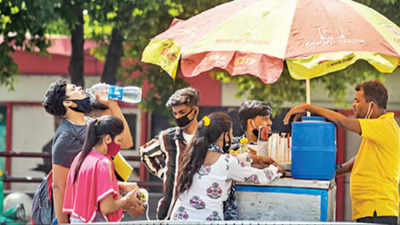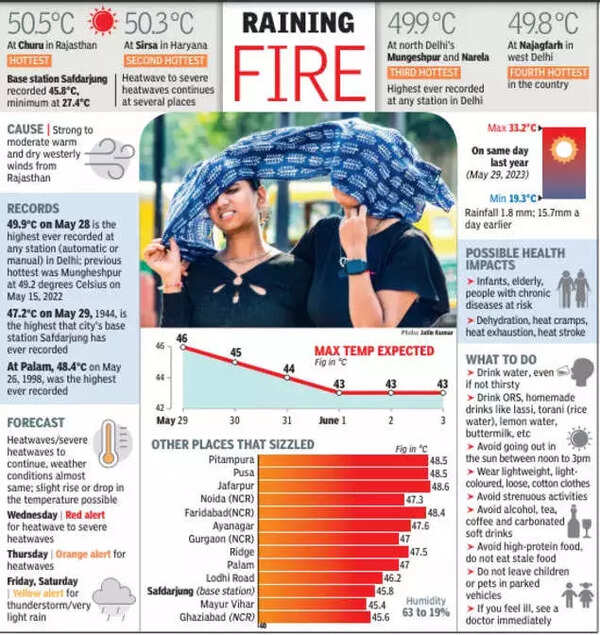- News
- City News
- delhi News
- Blame it on 'west': As Delhi flirts with 50°C, don't expect too much of a respite, says IMD
Trending
Blame it on 'west': As Delhi flirts with 50°C, don't expect too much of a respite, says IMD
Several areas in Delhi, including Mungeshpur, Narela, and Najafgarh, are facing severe heatwaves with temperatures well above normal levels.

Doctors say the heat stroke may lead to central nervous system dysfunction.
NEW DELHI: Rain is nowhere in sight in Delhi but it's definitely raining records, with parts of the capital just a touch shy of 50 degrees Celsius mark.
Rajasthan's Churu, meanwhile, was the hottest place in India on Tuesday at 50.5°C - close to its highest-ever temperature of 50.8°C. In Rajasthan's Phalodi, 51°C in 2016 is the all-time record in the country.

"The winds blowing into Delhi have a majority of westerly component from Haryana and Rajasthan.Under this impact, the city, especially its outer areas, are witnessing a huge rise in temperature," said Kuldeep Srivastava, senior weather scientist, IMD.
Apart from Mungeshpur, Narela and Najafgarh, several areas of the city, including Pitampura, Pusa and Jafarpur, also recorded severe heatwave on Tuesday, with the maximum temperature eight to nine notches above normal.
The situation was not much different in the city's neighbourhood. Gurgaon witnessed the season's highest temperature at 47 degrees Celsius on Tuesday, marking the third heatwave day this season. As the temperature soared, there was a forest fire at the Aravalis near Faridabad's Surajkund around 1pm on Tuesday. Although the fire department managed to douse the flames within 30 minutes, several acres and trees had already been charred, residents alleged. Noida sizzled at 47.3.
With temperatures exceeding 42 degrees Celsius, people are prone to heat stroke, which is a medical emergency characterised by an elevation in core body temperature, often exceeding 104°F (40°C). Doctors say the heat stroke may lead to central nervous system dysfunction. When the body's thermoregulatory mechanisms fail, extreme dehydration ensues, signalling an alarm.
Highlighting the perils of the hot temperatures, doctors warn that a heat stroke could even lead to a brain stroke in extreme situations, particularly when it causes excessive dehydration, which leads to the thickening of blood and makes its flow challenging throughout the body.
Meanwhile, the city continued to reel under poor air quality. The air quality index (AQI), on a scale of 0 to 500, was 244 on Tuesday, against 223 a day earlier.
Rajasthan's Churu, meanwhile, was the hottest place in India on Tuesday at 50.5°C - close to its highest-ever temperature of 50.8°C. In Rajasthan's Phalodi, 51°C in 2016 is the all-time record in the country.

"The winds blowing into Delhi have a majority of westerly component from Haryana and Rajasthan.Under this impact, the city, especially its outer areas, are witnessing a huge rise in temperature," said Kuldeep Srivastava, senior weather scientist, IMD.
Srivastava said since the westerly winds were dry, the humidity, too, had dropped, which was reflecting in the city's heat index or 'feel-like temperature'. "The heat index of the city on Tuesday was 47°C, while a few days back it was 55°C, even though the maximum temperatures were slightly lower then. Since the humidity is low, the discomfort level is not as high as it was a few days back," he said.
Apart from Mungeshpur, Narela and Najafgarh, several areas of the city, including Pitampura, Pusa and Jafarpur, also recorded severe heatwave on Tuesday, with the maximum temperature eight to nine notches above normal.
The situation was not much different in the city's neighbourhood. Gurgaon witnessed the season's highest temperature at 47 degrees Celsius on Tuesday, marking the third heatwave day this season. As the temperature soared, there was a forest fire at the Aravalis near Faridabad's Surajkund around 1pm on Tuesday. Although the fire department managed to douse the flames within 30 minutes, several acres and trees had already been charred, residents alleged. Noida sizzled at 47.3.
With temperatures exceeding 42 degrees Celsius, people are prone to heat stroke, which is a medical emergency characterised by an elevation in core body temperature, often exceeding 104°F (40°C). Doctors say the heat stroke may lead to central nervous system dysfunction. When the body's thermoregulatory mechanisms fail, extreme dehydration ensues, signalling an alarm.
Highlighting the perils of the hot temperatures, doctors warn that a heat stroke could even lead to a brain stroke in extreme situations, particularly when it causes excessive dehydration, which leads to the thickening of blood and makes its flow challenging throughout the body.
Meanwhile, the city continued to reel under poor air quality. The air quality index (AQI), on a scale of 0 to 500, was 244 on Tuesday, against 223 a day earlier.
End of Article
FOLLOW US ON SOCIAL MEDIA










